This is the lovely model Naoka originally from Japan and currently living in Mesa, Arizona. She decided to have a Japanese mafia dragon painted on her back and so we started by setting up a time and place to do the painting and discussed the specifics of the image that she had in mind. The following steps outline the process involved in completing the painting on a hot, sunny day in March in Arizona.
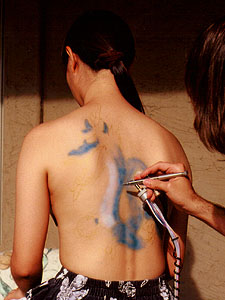 Process Body Painting Japanese Dragon
Process Body Painting Japanese Dragon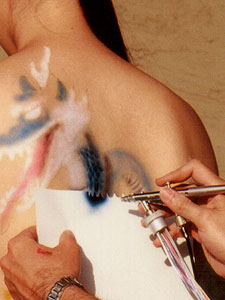 Process Body Painting Japanese Dragon
Process Body Painting Japanese Dragon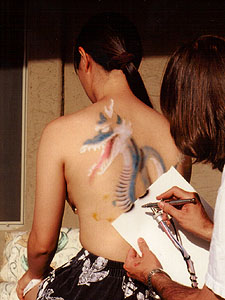 Process Body Painting Japanese Dragon
Process Body Painting Japanese Dragon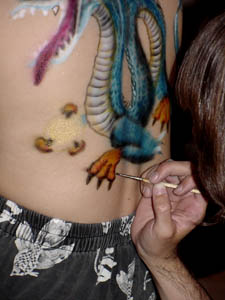 Process Body Painting Japanese Dragon
Process Body Painting Japanese Dragon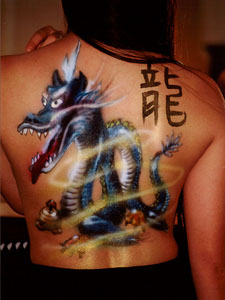 Process Body Painting Japanese Dragon
Process Body Painting Japanese Dragon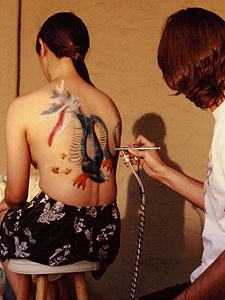 Process Body Painting Japanese Dragon
Process Body Painting Japanese DragonStep 2 - A rough sketch of the dragon was drawn on paper first to get the proportions an details ironed out before taking the plunge. The drawing was roughly based on a ceramic dragon, but also incorporated some features from a calendar that Naoka bought in Japan. Once the rough draft was completed, the next step was to draw an outline of the image on the models back using a paint pen. Gold is a good color to use since skin tones and reflections tend to wash it out in the final product.
Step 3 - Getting started with the actual painting, freehand the base colors and stay within the lines as best you can. It's always best to start with lighter colors with body paints because a thin layer of a darker color will show easily. If you try to lighten a darker color, you may need to build up a thick layer of paint to make it opaque.
Step 4 - The scales for the underbelly of the dragon were given form using a crude paper stencil. Take the time before starting to cut a few curves in several pieces of paper so that you can be prepared for this step. Luckily the alcohol based paint that I was using dried quickly allowing the use of the same stencil for numerous iterations.
Step 5 - Another paper stencil was used for the blue scales. To help give the impression of three dimensions, the scales were cut out to be narrower at the outer edge
Step 6 - Once the scales are defined, the next step is to start free-handing some shading and highlights throughout. The claws were painted with a mix of yellow and henna brown and shaded with some red and black. The talons were generally freehanded with intent to outline in the next phase of work. A few more stencils are needed to provide some sharp whiskers.
Step 7 - Once most of the colors and stencil work is done, it's time to put on the defining outlines and details. The main areas that seem to need the most attention are the the feet and the teeth. The white of the teeth tends to blend in with the models fair complexion in this instance and the outline helped to define them. A small brush was used sparingly to add sharpness to the talons also. Where overspray is a problem, there is the opportunity to remove the paint with rubbing alcohol, but I was able to avoid needing to "erase" this time.
Step 8 - Next up, make it pop out. The key to this is to add the overbearing highlights to the underbelly scales and parts of the legs and blue scales. This helps give the dragon a shinny appearance. A time consuming, but effective trick was to add tiny highlights at each scale also to give a somewhat glittery effect.
Step 10 - Since Naoka is from Japan she had no trouble showing me how to write dragon in Japanese characters. This part was brushed on to look legitimately hand-written. The finishing touch was to add a spray of golden smoke encircling the dragon and a light mist of gold was painted all over the entire painting to add sparkle. A thin line of white was also included to make the smoke stand out.
Step 11 - The photoshoot. For this session it was very important to correlate the Japanese dragon with the Japanese model. The mirror allowed us to show her oriental facial features as well as accentuate the painting on the back
